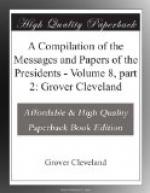The appointment of special deputy marshals is not made by the statute a spontaneous act of authority on the part of any executive or judicial officer of the Government, but is accorded as a popular right of the citizens to call into operation this agency for securing the purity and freedom of elections in any city or town having 20,000 inhabitants or upward. Section 2021 of the Revised Statutes puts it in the power of any two citizens of such city or town to require of the marshal of the district the appointment of these special deputy marshals. Thereupon the duty of the marshal becomes imperative, and its nonperformance would expose him to judicial mandate or punishment or to removal from office by the President, as the circumstances of his conduct might require. The bill now before me neither revokes this popular right of the citizens, nor relieves the marshal of the duty imposed by law, nor the President of his duty to see that this law is faithfully executed.
I forbear to enter again upon any general discussion of the wisdom and necessity of the election laws or of the dangerous and unconstitutional principle of this bill—that the power vested in Congress to originate appropriations involves the right to compel the Executive to approve any legislation which Congress may see fit to attach to such bills, under the penalty of refusing the means needed to carry on essential functions of the Government. My views on these subjects have been sufficiently presented in the special messages sent by me to the House of Representatives during their present session. What was said in those messages I regard as conclusive as to my duty in respect to the bill before me. The arguments urged in those communications against the repeal of the election laws and against the right of Congress to deprive the Executive of that separate and independent discretion and judgment which the Constitution confers and requires are equally cogent in opposition to this bill. This measure leaves the powers and duties of the supervisors of elections untouched. The compensation of those officers is provided for under permanent laws, and no liability for which an appropriation is now required would therefore be incurred by their appointment. But the power of the National Government to protect them in the discharge of their duty at the polls would be taken away. The States may employ both civil and military power at the elections, but by this bill even the civil authority to protect Congressional elections is denied to the United States. The object is to prevent any adequate control by the United States over the national elections by forbidding the payment of deputy marshals, the officers who are clothed with authority to enforce the election laws.
The fact that these laws are deemed objectionable by a majority of both Houses of Congress is urged as a sufficient warrant for this legislation.
There are two lawful ways to overturn legislative enactments. One is their repeal; the other is the decision of a competent tribunal against their validity. The effect of this bill is to deprive the executive department of the Government of the means to execute laws which are not repealed, which have not been declared invalid, and which it is therefore the duty of the executive and of every other department of Government to obey and to enforce.




